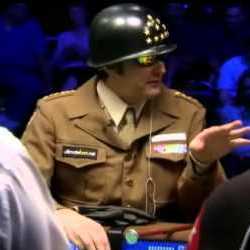Phil Hellmuth Jr. extended his World Series of Poker record by winning a 15th WSOP bracelet on Wednesday at the Rio All-Suit Hotel & Casino. Hellmuth won the 2018 World Series of Poker $5,000 Turbo No-Limit Hold’em Event.
The world record holder for most WSOP events won entered Wednesday’s play as one of 39 players with a chance to win the Turbo Event. On the final hand, Phil Hellmuth called Steven Wolansky’s all-in move while holding pocket 3s. When a third 3-card appeared on the flop, Hellmuth secured victory.
WSOP bracelets are given to winners of each seperate event. This year, the World Series of Poker has 72 separate events, so 72 separate WSOP bracelets are handed out. Given the small number even the legends of the game hold, winning a WSOP bracelet is still a special event.
Phil Hellmuth’s Record 15 WSOP Bracelets
Phil Hellmuth has held the record since 2007 when he won his 11th WSOP bracelet. Johnny Chan and Doyle Brunson previously were tied with Hellmuth for most WSOP bracelets with 10 apiece. Since then, Phil Ivey won a 10th bracelet, leaving Chan, Brunson, and Ivey tied for second place.
The so-called Poker Brat also holds the record for the most most final table appearances and most in-the-money finishes at the World Series of Poker, which has taken place every year in a Las Vegas casino since 1970. The WSOP expanded in 1976, so that more WSOP have bracelets every year.
Phil Hellmuth is already a Poker Hall of Fame member. His biggest claim-to-fame is winning the 1989 WSOP Main Event at the age of 24. To win, Hellmuth had to defeat Johnny Chan, who was at the time the back-to-back WSOP Main Event champion.
Winning WSOP Bracelets Post-Poker Boom
The current era of professional poker began in 2003, when Chris Moneymaker won the WSOP Main Event. Because Moneymaker was an amateur who had qualified by winning an online poker satellite through PokerStars, the 2003 WSOP led to a massive increase in popularity.
Where once only poker professionals entered the World Series of Poker, now thousands of players enter the WSOP Main Event each year. That makes it much harder for pro cardplayers to win events, even if their relative skill is greater than the average amateur player. Poker is a game which requires skill, but the element of chance means that one lucky amateur is still likeliest to collect a huge stack of chips by the final table.
Thus, winning in the era after the Poker Boom of 2003-2006 is, in many ways, even more impressive than winning events in the 20th Century. Since winning his 11th bracelet in 2007, Phil Hellmuth has added 4 more WSOP bracelets, which puts his record so far out from the other contenders that no one is likely to catch Hellmuth anytime soon.
Criticism of Phil Hellmuth
Phil Hellmuth detractors traditionally have had only two criticisms for the poker legend: his focus on Texas Hold’em and his behavior at the poker table. At one time, most of Phil Hellmuth’s WSOP bracelets were won in Texas Hold’em events, while many of the other top players have shown the ability to win a Omaha, Omaha Hi/Low, Seven-Card Stud, Razz, or HORSE. In the past few years, Phil Hellmuth branched out into other poker variants.
Two of his past four WSOP bracelets came from Razz, and Phil Hellmuth now claims he has a better record in Razz events than Ted Forrest himself. Nowadays, the quibble is that Hellmuth tries to max out his WSOP entries, because he is obsessed with increasing his bracelet count. That is somewhat like claiming Jordan Speil enters too many golf tournaments to increase his chances of winning golf trophies, or Roger Federer keeps playing tennis to increase his world record number of major wins. In all such cases — so what if they do? That somewhat the point of such records.
Criticism of Phil Hellmuth’s demeanor at the table is the more common complaint, and the one casual poker fans focus on the most. That was the case last week, when Phil Hellmuth’s rant during an all-in call set the poker community on Twitter ablaze.
Phil Hellmuth’s Positivity Focus
Phil Hellmuth is aware of the impact his bad behavior has had on a generation of amateur poker players, which is why he recently started the POSITIVITY movement. After the $5000 Turbo Event, Hellmuth spoke of the WSOP record and the Positivity movement, “It means everything. I want to be remembered in two ways: 1.) For having won 24 bracelets, and 2.) For starting the positivity movement. The spotlight that I have becomes a responsibility. Once I realized that I could inspire people, I took that seriously.”
“It’s humbling. I haven’t had a very good summer, but I’ve kept myself positive. Every night I come back to the room, saying, ‘Life is good, relax. Life is good, relax.’ Before this tournament, I called my wife and said, ‘Honey, I’m not sure I want to play this event. She said, ‘Get in there in play.'”
Some longtime poker viewers might think Phil Hellmuth is doing a comedy bit by saying he wants to be remembered for the Positivity Movement. Others probably consider him a classic frontrunner, who is a good sport when winning and a bad sport when losing. Still others might consider him devious, saving his poker trantrums for moments when it might cost an opponent who has trolled him money. Whatever poker fans think, Phil Hellmuth Jr. is the WSOP bracelet record holder — and that doesn’t seem like it will change anytime soon.

